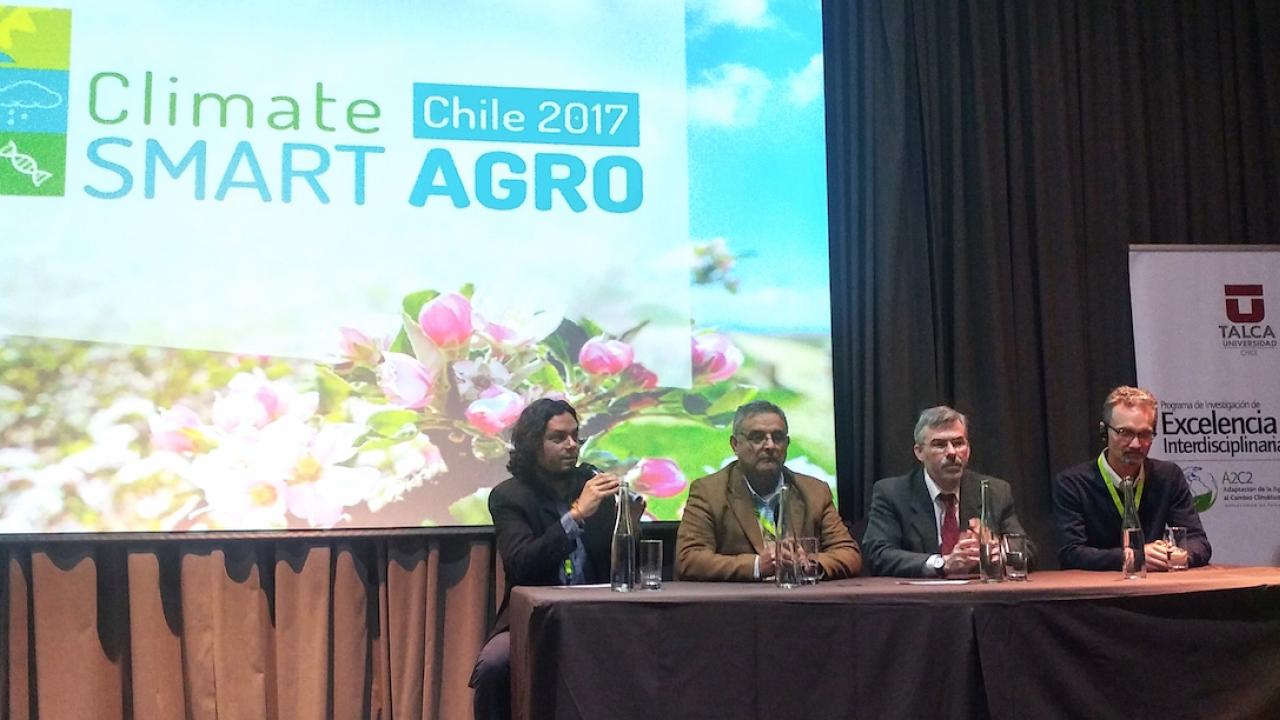
Climate Smart Agro tackles key issues in the face of the high climate variability in agriculture
UC Davis Chile and the University of Talca held the second version of the Climate Smart Agro, an annual platform which presents high impact science and technology for agro-climatic adaptation in Chile. This year the seminar was held on two dates and in two different cities: Tuesday 29 August in Talca and Thursday 31 August in Santiago.
Climate Smart Agro responds to the need to reduce the knowledge gap between supply and demand of solutions to the increasing climatic vulnerability of agricultural production. Its mission is to promote a technologically advanced, versatile and efficient agriculture in face of the environmental supply. For this reason this year experts in key issues related to climate change met up: integrated pest management, irrigation, crop adaptation and integrated water management.
The first speaker on both days was Jim Farrar, Director of the Statewide Program of Integrated Pest Management (IPM) of the Division of Agriculture and Natural Resources of the University of California (UC ANR). Doctor Farrar spoke about “Global warming and the future of the IPM.” Global warming increases the average temperature and the severity of droughts and storms. These environmental changes increase the stress on crops and modify the dynamics of pests. For the same reason, the IPM programs need to continually adapt to keep pace with these changes, some of which are already evident in California and the rest of the United States.
“UC ANR has academics throughout California working on continually improving agriculture and natural resource management, including responding to climate change. Adapting to climate change will require experts from many different disciplines to address the many and varied impacts on soil, irrigation, fertility, crop selection, production practice, and integrated pest management,” said doctor Farrar.
While Samuel Ortega, Director of the Research Program for the Adaptation of Agriculture to Climate Change (A2C2) and the Center for Research and Transfer in Irrigation and Agroclimatology (CITRA) of the University of Talca spoke about an “Integral system for water management agriculture using meteorological information and satellite images.”
“We have to conduct cutting-edge research, but also applied research including technological transfer to train farmers and to validate the technology. We were able to do this thanks to a good work plan in which we include sociologists and psychologists to evaluate how to reach people better with our message,” commented Doctor Ortega.
Alejandro del Pozo, of the Center of Genetic Improvement and Plant Phenomics and principal researcher of the A2C2 crop adaptation line of the University of Talca, focused his talk on the “Adaptation of crops to the changing climate.”
“Our challenge is to study the adaptation of crops to adverse conditions, basically to water stress in order to prepare more tolerant varieties. We consider that the efficient use of water is not about the plant saving water, but about using it well and if there is none that it protects and saves it. In short, it performs a high level of discrimination,” he explains. Doctor Pozo’s area of research is the ecophysiology of crops, especially cereals, legumes and smaller fruit plants such as the Chilean strawberry and blueberry.
The global hydrological scenario is complex and Chile is no exception. The effects of the climatic change accelerate the water cycles, generating – amongst other effects – longer droughts in the Mediterranean areas and greater humidity in humid areas or wetlands. For this reason the subject of the talk of Carlos Flores, Coordinator of the Program of Agronomy and Environment of UC Davis Chile, was “New Science and Technology for intelligent water management.”
“Since agriculture uses 70% of the available fresh water, intelligent water management is a priority. This must enable taking the best possible decisions for socioeconomic and environmental development and must therefore include technology in three areas: information, infrastructure and institutions,” explained Doctor Flores.
At the inauguration ceremony in Santiago, participated Alan Bennett, Executive Director of UC Davis Chile; María José Etchegaray, Executive Director of the Foundation for Agricultural Innovation (FIA), a Ministry of Agriculture’s agency; Juan Ladrón de Guevara, Executive Director of the Agency for Sustainability and Climate Change, and Samuel Ortega, Director of A2C2 and CITRA of the University of Talca.